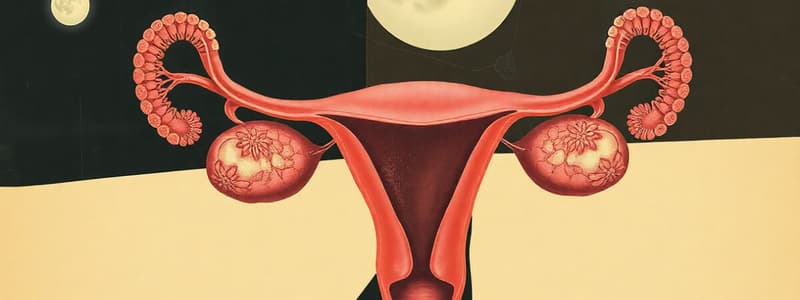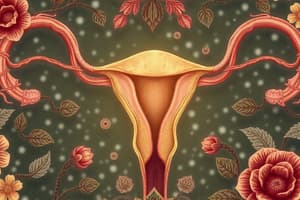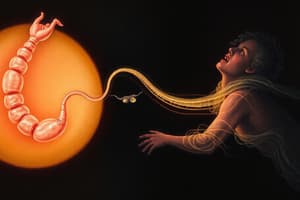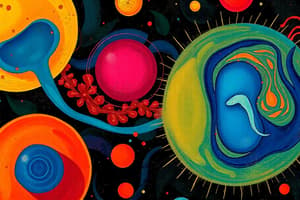Podcast
Questions and Answers
What is the primary function of the corpus luteum during the menstrual cycle?
What is the primary function of the corpus luteum during the menstrual cycle?
- Stimulates follicle maturation
- Regulates sleep patterns
- Secretes testosterone
- Secretes estrogen and progesterone (correct)
Which hormone is responsible for stimulating breast milk production?
Which hormone is responsible for stimulating breast milk production?
- Luteinizing Hormone (correct)
- Cortisol
- Luteinizing Hormone (correct)
- Follicle-Stimulating Hormone
What are the typical changes associated with hormonal fluctuations during the menstrual cycle?
What are the typical changes associated with hormonal fluctuations during the menstrual cycle?
- Mood changes, headaches, and bloating (correct)
- Heightened energy levels and improved focus
- Decreased hunger and thirst
- Increased muscle mass and endurance
What role does the hypothalamus play in the endocrine system?
What role does the hypothalamus play in the endocrine system?
What hormone is primarily responsible for follicle maturation in males?
What hormone is primarily responsible for follicle maturation in males?
How long does the corpus luteum typically maintain its function before breaking down?
How long does the corpus luteum typically maintain its function before breaking down?
Which gland produces cortisol, known as the stress hormone?
Which gland produces cortisol, known as the stress hormone?
What is the primary function of melatonin in the body?
What is the primary function of melatonin in the body?
During spermatogenesis, which cell type is produced directly after the completion of Meiosis I?
During spermatogenesis, which cell type is produced directly after the completion of Meiosis I?
Which part of the sperm is primarily responsible for its motility?
Which part of the sperm is primarily responsible for its motility?
What is the total number of haploid daughter cells produced from one original spermatogonium after the completion of meiosis?
What is the total number of haploid daughter cells produced from one original spermatogonium after the completion of meiosis?
At which point does spermiogenesis occur in the process of spermatogenesis?
At which point does spermiogenesis occur in the process of spermatogenesis?
What is the primary function of the midpiece of a sperm cell?
What is the primary function of the midpiece of a sperm cell?
Which structure in the female reproductive system serves to protect the internal parts and provides entry for sperm?
Which structure in the female reproductive system serves to protect the internal parts and provides entry for sperm?
What is the typical range of sperm produced by an adult male per day?
What is the typical range of sperm produced by an adult male per day?
What role does pubic hair play in the female reproductive system?
What role does pubic hair play in the female reproductive system?
What is the primary purpose of the seminiferous tubules in the male reproductive system?
What is the primary purpose of the seminiferous tubules in the male reproductive system?
Which process is directly stimulated by testosterone and FSH during spermatogenesis?
Which process is directly stimulated by testosterone and FSH during spermatogenesis?
Which structure connects the testes to the urethra?
Which structure connects the testes to the urethra?
What term describes the movement of sperm cells to the epididymis for maturation?
What term describes the movement of sperm cells to the epididymis for maturation?
Which component of sperm contains enzymes essential for fertilization?
Which component of sperm contains enzymes essential for fertilization?
At what temperature must the testes be maintained for optimal sperm production?
At what temperature must the testes be maintained for optimal sperm production?
What role does the epididymis play in the male reproductive system?
What role does the epididymis play in the male reproductive system?
What is the primary male gamete produced during spermatogenesis?
What is the primary male gamete produced during spermatogenesis?
Flashcards
Endocrine System
Endocrine System
A system of ductless glands that release hormones directly into the bloodstream to coordinate bodily functions.
Hormones
Hormones
Chemical messengers that instruct cells to alter their activities.
Hypothalamus
Hypothalamus
Connects the nervous and endocrine systems, controlling hormones from the central nervous system.
Luteinizing Hormone (LH)
Luteinizing Hormone (LH)
Signup and view all the flashcards
Corpus Luteum
Corpus Luteum
Signup and view all the flashcards
Pineal Gland
Pineal Gland
Signup and view all the flashcards
Thyroid
Thyroid
Signup and view all the flashcards
Adrenal Gland
Adrenal Gland
Signup and view all the flashcards
Spermatogonia
Spermatogonia
Signup and view all the flashcards
Spermatocyte
Spermatocyte
Signup and view all the flashcards
Meiosis
Meiosis
Signup and view all the flashcards
Spermatids
Spermatids
Signup and view all the flashcards
Spermiogenesis
Spermiogenesis
Signup and view all the flashcards
Epididymis
Epididymis
Signup and view all the flashcards
Mitochondria (Midpiece)
Mitochondria (Midpiece)
Signup and view all the flashcards
Sperm Motility
Sperm Motility
Signup and view all the flashcards
Adolescence
Adolescence
Signup and view all the flashcards
Penis (function)
Penis (function)
Signup and view all the flashcards
Seminiferous Tubules
Seminiferous Tubules
Signup and view all the flashcards
Epididymis (function)
Epididymis (function)
Signup and view all the flashcards
Vas Deferens
Vas Deferens
Signup and view all the flashcards
Sperm (head)
Sperm (head)
Signup and view all the flashcards
Testosterone
Testosterone
Signup and view all the flashcards
Study Notes
Reproductive System
- Gametes: Sex cells; male = sperm, female = egg cell
- Gametogenesis: Formation of sex cells
- Fertilization: Union of sperm and egg cells
- Sexual reproduction functions: Production of gametes, fertilization, development, and nourishment (milk production), hormone production, and increase genetic variability.
Male Reproductive System
- Testes: Male reproductive organs; singular = testis; enclosed in scrotum; produce testosterone; contain seminiferous tubules for sperm development; located outside body for lower temperature.
- Epididymis: Long, coiled tube on back of testes; stores sperm temporarily for maturation (capacity to swim); transports sperm to vas deferens.
- Vas Deferens: Tube connecting testes to urethra; allows semen exit; transports sperm.
- Seminal Vesicle: Two small glands, store and produce fluid mixing with sperm to create semen; slightly alkaline.
- Prostate Gland: Secretes fluid that nourishes, protects, and transports sperm.
- Cowper's Gland (Bulbourethral Gland): Produces pre-ejaculate fluid; lubricant during sexual intercourse.
- Urethra: Tube through which urine and semen exit the body; allows semen and urine exit.
- Penis: Male organ for copulation (intercourse); transfers sperm to female; genitals arousal leads to stimulation from Parasympathetic Neurons System (morning erections, hormone shift).
Sperm Production and Ejaculation
- Spermatogenesis: Production and maturation of sperm cells in seminiferous tubules; involves meiosis.
- Seminiferous Tubules & Epididymis: Work together about 3-4 weeks for sperm production and maturation.
Female Reproductive System
- Ovaries: Produce egg cells and hormones (estrogen, progesterone); responsible for secondary characteristics development; egg highest in first half of menstruation.
- Fallopian Tubes: Tubes where fertilization occurs; about 4-5 inches long.
- Uterus: Largest part of the uterus; expands during pregnancy.
- Cervix: Lowest part of the uterus; prevents things from entering; allows sperm entrance and menstrual blood exit (opens during delivery).
- Vagina: Birth canal; widens during childbirth and shrinks back to hold things; depth around 3-7 inches.
- Hymen: Piece of tissue; internal part of vagina
- Labia Majora/Minora: Folded skin; protects and covers.
- Clitoris: Sensitive protrusion; covered by skin (prepuce).
Menstrual Cycle
- Oogonium: Immature egg cell
- Ovum: Mature egg cell
- Oogenesis: Production of egg cells; limited to 300-500 mature cells in a lifetime.
- Ovulation: Monthly release of an ovum from the ovary.
- Menstruation: Monthly shedding of the uterine lining if egg is not fertilized; blood vessels break, leading to bleeding.
- Follicular Phase: FSH and LH in blood; follicle develops estrogen.
- Ovulation Phase: Ovum released; estrogen and progesterone increase.
- Luteal Phase: Rupture follicle forms corpus luteum, secretes estrogen/progesterone; hormonal changes.
Endocrine System
- Glands: Organs that secrete hormones (chemical messengers) in the blood; 50 hormones and 12 glands; effect lasts for hours, weeks, or years.
- Hypothalamus: Connects nervous and endocrine systems; controls hormones from the central nervous system.
- Pituitary Gland: Releases hormones influencing various body functions.
- Pineal Gland: Produces melatonin; sleep regulation.
- Thyroid: Regulates metabolism.
- Adrenal Gland: Produces cortisol (stress hormone).
- Pancreas: Produces insulin and glucagon (regulate blood glucose).
- Ovaries: Produce estrogen and progesterone for female development.
- Testes: Produce testosterone for male development (fertility, puberty).
Studying That Suits You
Use AI to generate personalized quizzes and flashcards to suit your learning preferences.



